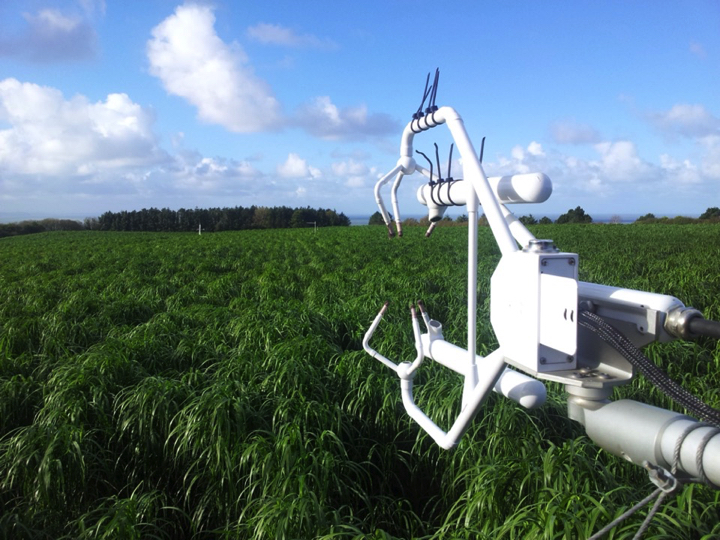Aberystwyth University to lead on greenhouse gas removal research with major grant

Greenhouse gases measured in a field of Miscanthus in Aberystwyth.
24 May 2021
Scientists at Aberystwyth University will play a leading role in a major government-funded drive to remove greenhouse gases from the atmosphere.
As part of a UK Research and Innovation (UKRI) investment of £30 million over four-and-a-half years, researchers at Aberystwyth’s Institute for Biological, Environmental and Rural Sciences (IBERS) will lead a consortium of partners to develop biomass crops. They will also collaborate on the restoration of peat soil as part of the greenhouse gas removal projects.
Alongside project partners, they will be demonstrating the latest technologies for planting willow and Miscanthus, the two perennial biomass crops that are best suited to UK conditions.
The work will be led by Aberystwyth University in collaboration with Aberdeen University, Rothamsted Research, Gloucestershire University, the UK Centre for Ecology & Hydrology, and will benefit from the industrial expertise of Terravesta Ltd and Willow Energy.
The research also involves new field trials at Bishop Burton College, Yorkshire and Myerscough College, Lancashire.
Both crops grow well on land that is less suited to food production, and can be harvested every one to three years.
Since they remove carbon dioxide from the atmosphere as they grow, they are regarded as a renewable and low carbon source of electricity.
The team will also undertake detailed measurements of carbon flows in order to more accurately account for this carbon.
Professor Iain Donnison, Head of the Institute of Biological, Environmental & Rural Sciences (IBERS) at Aberystwyth University, commented:
“It’s a great privilege to have been selected to take a leading role in this very important investment in efforts to tackle climate change. The project we lead, along with the others, will make important contributions to meeting the net zero climate targets which are so vital to protecting the future of our planet.
“We’re also excited by the wider opportunities that will come from demonstrating the crops at our partner sites. Both Bishop Burton and Myerscough Colleges have large numbers of students enrolled on agriculture courses, and also act as hubs within their local farming communities. This gives us a real opportunity both to engage young people in practical research, and also to reach existing farmers in surrounding communities via conferences and open days.”
Greenhouse Gas Removal describes a range of technologies to directly remove CO2 from the atmosphere, that aim to counteract human-caused climate change by deliberate large-scale intervention.
The results will be used to shape longer-term government decision-making on the most effective technologies to help tackle climate change and reduce CO2 emissions in order to meet net zero carbon emissions by 2050.
A key feature of the investment is to fund both individual projects, and a ‘Hub’, co-ordinated by Oxford University, that specifically addresses the importance of economic and social factors, and how this impacts on future policy.
The £31.5 million programme is part of the second wave of the UK Government’s Strategic Priorities Fund (SPF), which invests in high quality multi and interdisciplinary research.
This is the largest programme to assess greenhouse gas removal methods funded by the UK government, through UKRI, to date.
Professor Sir Duncan Wingham, Executive Chair of the Natural Environment Research Council, part of UKRI, said:
“Reducing greenhouse gas emissions is a priority for the UK, but it’s clear that alone that will not be enough to reduce CO2 and meet the UK’s net zero climate target by 2050.
“These projects will investigate how we can actively remove greenhouse gases from the atmosphere using innovative technologies at the scale required to protect our planet. This investment by UKRI is especially significant as the UK prepares to host COP26 in Glasgow later this year.”
Collaborating with scientists at the UK Centre for Ecology & Hydrology in Bangor, Aberystwyth University staff will also work on another greenhouse gas removal project on peat restoration.
Peat is made up of decomposed plant matter that has accumulated over thousands of years, and represents a huge carbon store.
Many peat soils in the UK are in poor condition and are contributing to carbon emissions.
Preventing further decline in the amount of carbon stored and improving the habitat, so that it can once again sequester atmospheric carbon, improves biodiversity and helps combat climate change.
Dr Mariecia Fraser from Aberystwyth University added:
“In their recent advice to the Welsh Government, the Committee on Climate Change have indicated that around 40,000 hectares of peat in Wales should be restored by 2050 as part of Wales’ contribution to combatting climate change. In this project we will demonstrate how it is possible to restore upland blanket bogs by removing the dominant Molinia and increasing the amount of Sphagnum moss. We will also investigate how the plant material that we remove from these areas can be treated to produce a biochar fertiliser.”



